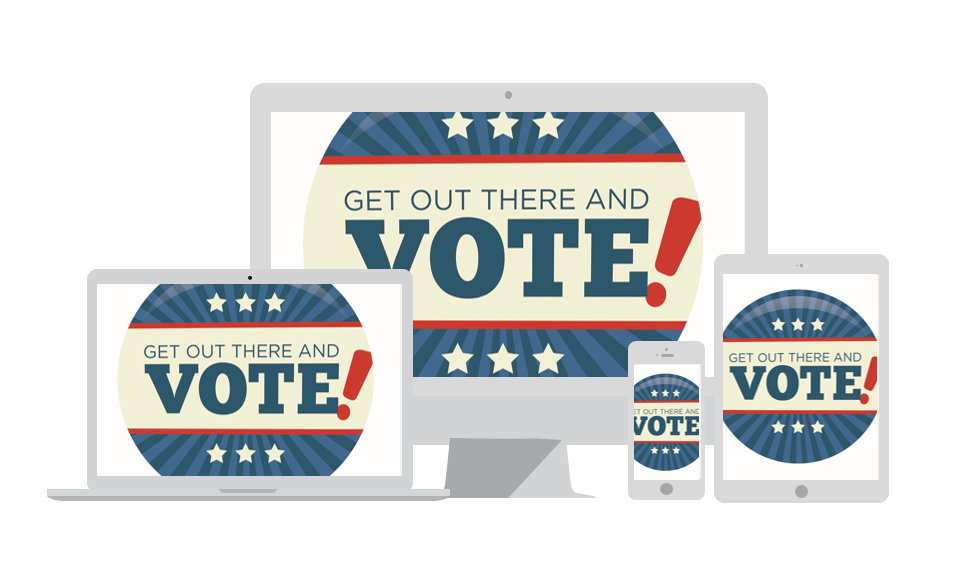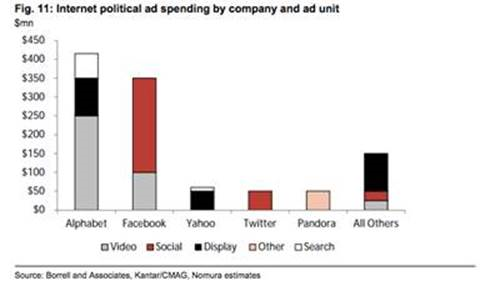
For some time now, the advertising industry has been talking about the fragmented media landscape and how advertising dollars are expected to shift from traditional to online. One segment of advertising, which will surely be meticulously analyzed, is political ad dollars in this 2016 election year.
According to multiple sources, up until now political advertisers have treated the Internet as a novelty. For example, in 2008 digital political ad spending accounted for a measly $22 million of the $6.2 billion campaigns spent on advertising (Kafka, 2016). They also mentioned that 2016 is the first year that political online ad investment will reach around $1 billion in spending by November. Comparing that to Television, TV broadcast ads have been projected at an estimated $6 billion. However, the online spending projections are twice that spent on the Internet in the past four election cycles combined (Gebelhoff, 2016).
There is no doubt these shifts are congruent with the overall shift that is occurring. But the volume of dollars and media thrown into election years is a particularly massive takeover.

(Kafka, 2016)
There are a number of reasons for this shift:
- It’s cheaper than TV and easy to implement.
- In theory, any candidate has equal access to having a voice online.
- Compared to TV, there’s no limit to airtime on the Internet. A political candidate’s reach is bound only by the following they can build.
- Political campaigns can utilize anonymous user data, letting sophisticated advertisers target voters at a granular level. As a result, advertisers can mold their messages to closely fit voters’ perspectives and viewpoints.
Traditionally, political TV ads (whether you know it or not), are highly monitored. However, the Federal Election Commission has refused to expand its scope to regulating online ads so far. Right now, political action committees are required to disclose who’s behind the ads only if they were bought on websites. Additionally, free online media accounts (such as YouTube, Facebook or Instagram), are fairly unregulated territory (Gebelhoff, 2016).
How is the Internet Transforming Political Advertising?
Let’s look at this another way. Now that ad dollars are increasingly being thrown into digital media, how is the age of the internet transforming how people view politics and political ads? Some say that social media sites like Facebook and Twitter are creating what scholars are calling “echo chambers.” The study looked at how Facebook users belonging to different communities interacted with two different narratives. How did it turn out? The results indicated that users tended to promote their favorite storyline, form polarized groups, and resist information that doesn’t confirm to their beliefs. Users tended to seek out information that strengthened their preferred narratives and reject information that undermined it. Alarmingly, when deliberately fabricated information was introduced into these echo chambers, it was absorbed and viewed as credible as long as it conformed to the primary narrative (Emba, 2016).
Why does this surprise us? It doesn’t, that’s the truth. Much of today’s society would rather hear more of what they already agree with rather than questioning the accuracy of the stories they are being told. Today, two in three Facebook users report getting their news from the platform, which is nearly half of the US population (Gottfried, 2016). For voters today, the mainstream media (now including digital) is going to have to be questioned rather than relied upon for true and accurate information that is unbiased.
Theories around TV Ads and Election Wins
TV ads (and complaining about them) are a time-honored tradition of elections. Television does a few things well. One is that they have mass reach to the population — 87% of people over 18. No other single advertising medium in comes close. Because TV ads reach a lot of people, they also are super effective, dollar for dollar (Kurtzleben, 2015). In addition to effective reach, TV ads stimulate emotions via visual and audio storylines for the viewer.
However, there are issues that the TV ads face in our ever fragmented industry, which are well known today. Not only is it expensive, but user attention is also fragmented due to online video (ex. Hulu, Netflix, YouTube etc).
While history proves that presidential campaigns have produced memorable television ads that have helped sway public opinion and win elections, many of the old rules of campaigning have been broken in 2016’s decidedly unusual election season.
Enjoy this presidential ad from Ronald Regan’s 1984 campaign, “Morning in America”. Comical to look back at decades passed and the advertising that spurred popular decision. It is also quite funny to think how different things are today. Once upon a time, people had to get up to change their channels or turn down the volume to avoid ads. Today, ads can be avoided in multiple ways (remote controls, mute, fast forward, orfiddling with phones during commercial breaks) (Kurtzleben, 2015).
This year will undoubtedly be scrutinized by our industry. In my opinion, the main thing to remember during election years is that each candidate is always going to try and bash the other. We all know it, yet, ads still influence our perception of individual candidates. The important thing to do is do your homework; seek out information and remain objective, stay vigilant and weary to the accuracy of information that is being presented to you, form your own opinions on which economic and social points you align with, and gauge how closely they align with each candidate’s views. Make your decisions based off of your own research, and not just what the media is feeding you. No matter which side of the aisle you stand, it is our American right and privilege to go vote! Meet you at the polls.

S T E F A N I E O ‘ C O N N O R
Media Account Supervisor
Sources:
Emba, Christine. “Confirmed: Echo Chambers Exist on Social Media. So What Do We Do about Them?” The Washington Post. N.p., 14 July 2016. Web. 30 Aug. 2016.
Gebelhoff, Robert. “How Will the Internet Change Political Advertising?” The Washington Post. N.p., 8 Aug. 2016. Web. 30 Aug. 2016.
Gottfried, Jeffrey. “New Use Across Social Media Platforms 2016.”PewResearchCenter. N.p., 26 May 2016. Web. 30 Aug. 2016.
Kafka, Peter. “2016: The Year Election Ads Finally Come to the Internet.” Recode. N.p., 07 Apr. 2016. Web. 30 Aug. 2016.
Kurtzleben, Danielle. “2016 Campaigns Will Spend $4.4 Billion On TV Ads, But Why?” NPR. N.p., 19 Aug. 2015. Web. 30 Aug. 2016.
